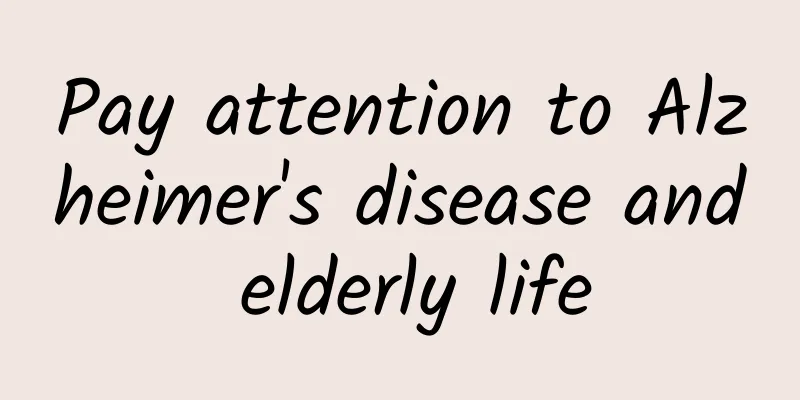Pay attention to Alzheimer's disease and elderly life

|
1. What is Alzheimer’s disease? It refers to the impairment of one or more functions in multiple areas of cognitive function, including memory, attention, language, execution, reasoning, calculation and orientation. It can affect the patient's social function and quality of life to varying degrees, and in severe cases, even lead to the patient's death. 2. What are the clinical manifestations and stages of Alzheimer's disease? 1) Early symptoms (disease period 1-3 years) → Memory impairment: Mainly recent memory impairment, with symptoms such as repeated asking of the same questions and repeated answers, forgetting where things are placed, difficulty learning new things, and even not being able to recall things later, even if they are remembered for a while. → Other cognitive impairments: decreased spatial and temporal orientation, graphic orientation, judgment, and problem-solving abilities; difficulty finding words, reduced oral vocabulary, difficulty naming, and inability to write articles → Personality changes: emotional indifference, becoming passive, losing interest in things, staying at home, and sometimes irritability may be the earliest symptoms; can take care of themselves in daily life and deal with things around them; may have mental symptoms such as delusions 2) Mid-term symptoms (disease period 2-10 years) → Severe impairment of both long- and short-term memory: New things are easily forgotten, and long-term memory impairment occurs, such as confusion about relationships with relatives and other people. → Other cognitive impairments gradually develop: visual-spatial disorientation, easy to get lost even in familiar places; significantly reduced judgment and problem-solving abilities; verbose speech, fluent aphasia, and fuzzy abstract vocabulary concepts; reduced or inability to calculate; reduced comprehension and reading abilities → Obvious personality changes: obvious behaviors that cause trouble to others, instability and irritability, day and night reversal and sleep disorders, aggressive words or behaviors, and suspicion. Difficulty in taking care of oneself: simple activities such as washing dishes and dressing become difficult without help. Mental state: irritability, some patients have mental symptoms such as delusions. 3) Late stage symptoms (disease duration 8-12 years) → Severe memory loss: only fragments of memory remain, and even close family members cannot be recognized → Other cognitive dysfunctions: imitating and repeating language, only repeating simple words and phrases, only understanding extremely simple spoken language, visual, orientation and motor dysfunction. May have aphasia, agnosia, apraxia, limb rigidity, paralysis or epileptic seizures, prone to falling. No response to external stimuli, incontinence, basic life depends on caregivers. 3. How to prevent Alzheimer's disease 1) Lifestyle: → Weight management: Reasonably control your weight to keep your BMI within the range of 18.5-24.9kg/m2 → Physical exercise: Do regular physical exercise Physical activity: walking, cycling, doing housework, sports and other leisure interactions At least 150 minutes of moderate-intensity aerobic physical activity or at least 75 minutes of vigorous-intensity aerobic physical activity per week, or an equivalent combination of moderate and vigorous intensity Exercise improves brain health and reduces the risk of related diseases Sports require someone to accompany you → Cognitive activities: Engage in more stimulating mental activities, such as reading, playing chess, singing, dancing, etc., and especially participate in group activities, such as choirs, dance groups and other social welfare activities. → Quitting smoking, avoiding exposure to environmental tobacco smoke, providing counseling services for smokers, nicotine replacement therapy and other drug treatments to complement behavioral programs or formal smoking cessation programs → Quit drinking and reduce the stimulating effects of alcohol. → Sleep: Ensure adequate and good sleep. If you have sleep disorders, consult a doctor or seek timely treatment. When sleeping, keep the room quiet, dimly lit, well-ventilated, and with appropriate temperature and humidity. Sleeping habits, environment, and life should be regular, and daytime naps should be limited to prevent patients from reversing day and night. Avoid drinking coffee, strong tea and other beverages in the afternoon. The room should have plenty of sunlight during the day, the lights in the room should be bright at dusk, and the bedroom should have clear day and night differences. Quiet environment, regular life, and good habits 2) Control other diseases: Control diabetes, cardiovascular disease and other diseases. → Timely treatment of underlying diseases → Manage your own chronic diseases → Good oral hygiene management → Manage infectious diseases well 3) Family Care → Accompany the elderly and spend time with family members and relatives → Communicate with the elderly → Pay attention to the emotions of the elderly → Encourage the elderly to live independently and do more work and move more → Play games with the elderly Family warmth, family love and family companionship are the best way to recover References: 1. World Federation of Chinese Medicine Societies. International Guidelines for Clinical Practice of Traditional Chinese Medicine for Alzheimer's Disease[J].2021,16(8):1181-1187. 2. Zhang Yaru, Yu Jintai. International guidelines for evidence-based prevention of Alzheimer's disease[J]. Science and Technology Review, 2021, 39(20): 110-115. |
>>: What does it mean to give perfume as a gift? How to store perfume
Recommend
What are the best days for conception?
People who are planning to have a baby should cal...
Can I drink milk tea during confinement?
Milk tea was originally a daily drink of nomadic ...
The harm of essential oil breast enhancement
Many female friends desire to have a plump and gr...
What to do if a woman has a bit of odor in her lower body
If a woman's lower body has a bit of odor, it...
Why do I have pain on the outside of my breasts?
Recently I have noticed that both sides of my bre...
What are the early symptoms of mastitis?
Nowadays, breast diseases can be said to be a pro...
Smelly discharge after cervical erosion surgery
The diseases that women are afraid of are gynecol...
Be careful! Eating raw eggs can be fatal! Be careful when choosing →
In recent years, raw eggs have become one of the ...
Why do I feel sore legs during the confinement period?
During the confinement period, people need to pay...
What happens after the transplant is implanted?
What symptoms after embryo transfer indicate that...
Fingertip blood sugar level of pregnant women 2 hours after meal
For pregnant women, there are many things they ne...
Does a woman's light menstrual flow mean low estrogen?
Menstrual problems bother many women. Whenever th...
What's the matter with the gynecological odor?
Gynecological diseases are common diseases among ...
What to do if a woman's lower body is swollen
We know how great an impact gynecological disease...
Is it normal to have your period five days early?
Female friends have menstruation every month. If ...









